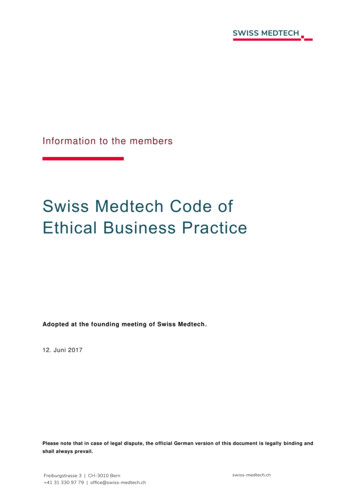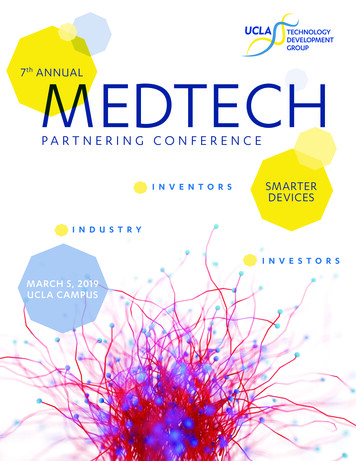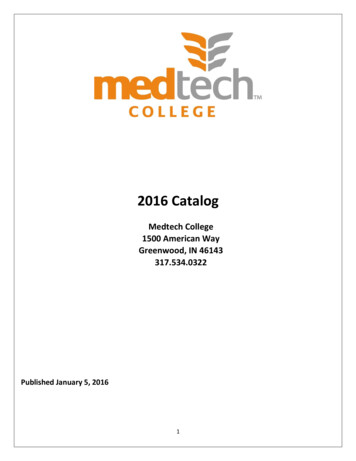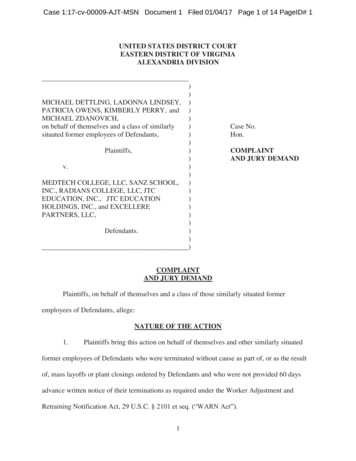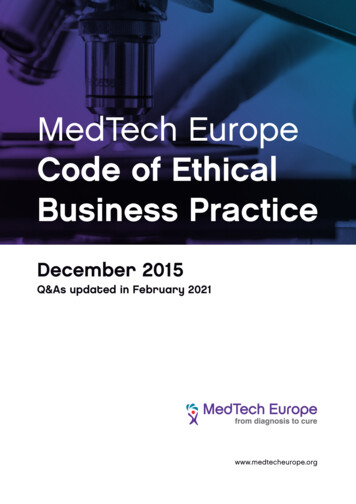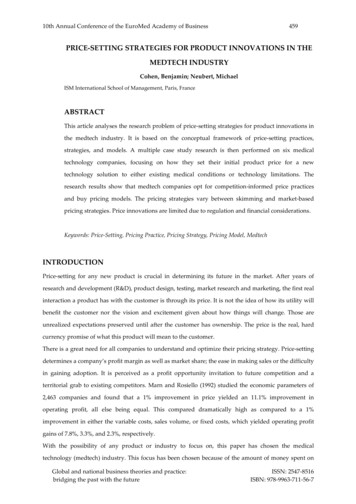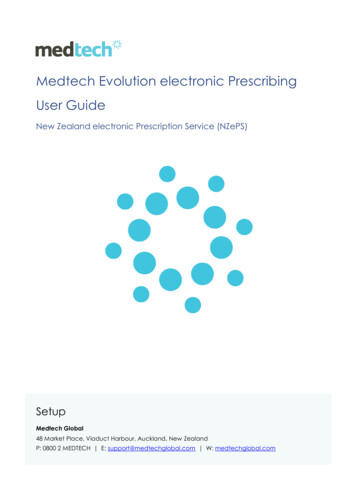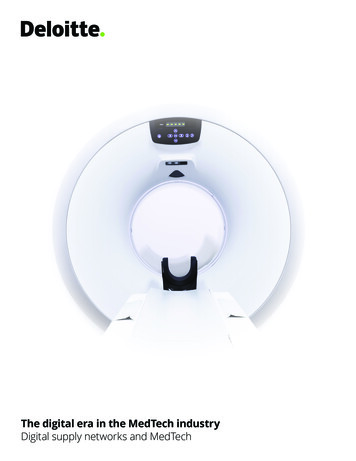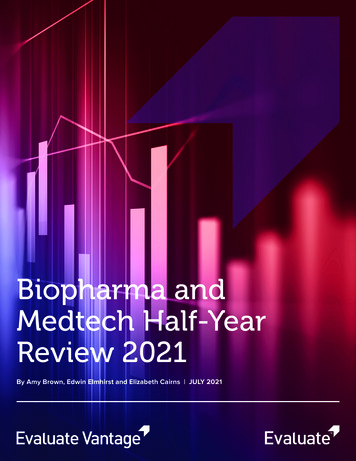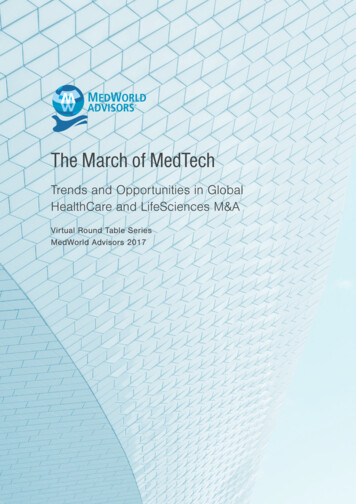
Transcription
MEDWORLDADVISORS The March of MedTechTrends and Opportunities in GlobalHealthCare and LifeSciences M&AVirtual Round Table SeriesMedWorld Advisors 2017
Virtual Round Table The March of MedTechThe March of MedTechTrends and opportunities in global healthcare M&AThe global healthcare industryis huge and growing largerevery year.Healthcare M&A made up 6 per cent of EuropeanHealthcare encompasses specialist sectors such asshare of total M&A activity at 7.3 per cent from a marketBioMed and MedTech as well as more establishedworth USD34 billion. The picture was even more healthyindustries such as traditional healthcare and pharmaceu-in India, with 13.6 per cent of deals taking place in theticals. These newer life science tech sectors are growinghealthcare sector, from a total market worth USD24in strength as advances in medicine and human healthbillion.continue unabated, while the traditional sectors profit fromgrowing populations.While Europe and the US remain leading centres for thehealthcare industry, the emerging powerhouses of Indiaand China are becoming hotspots for innovation, investment and acquisition.mid-market M&A in 2016, a market worth USD256 billionin total, according to Thomson Reuters. Healthcare M&Awas particularly strong in Germany during 2016, with theFinance for these M&A transactions often comes fromthe US which has a long track record of private equityinvestment in healthcare and related industries.Figures from Silicon Valley Bank (SVB) for mid-year 2017describe a real seller’s market in the US, revealing thatUS healthcare venture fundraising for the full-year 2017 isAs the industry expands, emerging technology start-certain to surpass USD6 billion, and could set a full-yearups are rapidly becoming targets for larger acquisitiverecord.competitors that have strategic portfolio gaps to fill.Opportunities for consolidation are also being created forestablished businesses looking to strengthen their gripon a sector. Additionally, PE activity is creating alternativeexit paths for mature middle market companies in MedTech and BioMed.Figures from international consultancy Bain reveal thathealthcare M&A reached USD546 billion in announceddeal value in 2015, which was an increase of 2.5 timeson the average annual deal value of the previous decade.More figures from Bain back up this trend, showing thatgrowth in healthcare M&A deals significantly outpacinggrowth in overall deals over the past few years. From2012 to 2015, overall M&A grew at a compound annualgrowth rate (CAGR) of 24 per cent while healthcare M&Agrew more than twice as fast, at a 50 per cent CAGR.Biopharma seems to be driving this enthusiasm, set toclosely match investment levels for 2016 at around USD8billion, according to SVB. The bank predicts that the USbiopharma sector should see between 28 and 32 IPOsin 2017 and 15 acquisitions, driven by a strong privatecompany backlog.One emerging trend SVB highlight is the tendency fortech-focused investment firms to aggressively investin healthcare companies that are developing artificialintelligence and machine learning (AI/ML) technologiesdesigned for biopharma.With these trends in mind, IR Global brought togetherthree senior members of healthcare M&A consultancyMedWorld Advisors, along with four members of theirsenior advisory network, to discuss the opportunities inglobal healthcare M&A in more detail.The following discussion addressed the current landscape for healthcare M&A, analyses how businesses canboost their value prior to sale and highlights the expertisethe MedWorld Advisors network can bring to bearpreparing healthcare businesses for value maximisingacquisition.
Florence Joffroy-Black, pictured at the 2017 Dealmakers Conference in Barcelona.The View from MedWorldFlorence Joffroy-BlackCEO/PRESIDENTPhone: 1 978 273 8295Email: florencejblack@medworldadvisors.comFlorence is a medical device marketing executive with more than 25 years of expertise and experiencein international markets.Born in France and now living in the U.S., she has true global presence, knowledge and insight. Florencehas acted as a Global Vice President and Global Director of Strategic Marketing for a variety of publicand private corporations (including private equity-backed), including Draeger Medical, Itamar Medical andBeaver Visitec International.She has acted as a marketing expert/consultant for corporations such as HP Medical, Tyco Electronicsand TRW. Florence has a Double Master’s Degree in Marketing and Finance.Welcome to MedWorld Advisors,We are an International M&A Advisory Firm dedicated to the field of MedDevice, MedTech, Biomed, BioTech, Life Sciences, Digital Health and Emerging Technologies. Located in the United States we have anestablished entity in Hong Kong as well as partnering offices around the world in Switzerland, Germany,Netherlands, Israel, Canada, China, India, South Africa and many more locations. We are rapidly expandingand new locations will be available soon. We are excited to feature some of our senior advisors in thisbrochure.Our advisors are seasoned professionals with great successes under their belt. Some have held key positions in Fortune 500 companies, and have successfully bought and sold companies, achieving great valueimprovements for their stakeholders along the way. We have R&D talents and even a medical doctor on ourboard. We are unique in the way we work closely with key strategic companies in our industry as well as private equity firms. We are known for our cross-border and C-Suite relationships and for getting the job done.We look forward to meeting you and helping you and your clients achieve great success.Cheers!Florence and the MedWorld Advisors Teamwww.medworldadvisors.com page 3
Virtual Round Table The March of MedTechU SA - M AS SAC HU SE T T SN E T H E R L A ND SSW I T ZE R L A N DDave SheppardShai KuttnerBalthasar WickiPrincipal and FounderMedWorld AdvisorsPartnerBWK PartnersSenior PartnerWicki Partners AGPhone: 1 978-684-2712Phone: 31 20 2400 710Phone: 41 43 317 1178Email: davesheppard@medworldadvisors.comEmail: s.kuttner@bwkpartners.comEmail: wicki@wickipartners.chDave has been a leader in the Medical DeviceShai Kuttner has extensive experience inBalthasar Wicki has gained a wealth of expe-Industry for more than 30 years.cross-border mergers & acquisitions, as well asrience in dealing with phases of growth, con-finance and investments transactions. He hasflict and change. Entrepreneurs and companiesclose ties with multinational companies in Eu-value his in-depth approach to business man-rope, Israel and the United States.agement, his ability to understand complexHe has taken President, GM and VP roles atcompanies of various size including Covidien,and has done much work at start-up organisations (including working pre-IPO on a success-Shai founded a mid-size international law firmful IPO company).in Amsterdam in 1994, joining forces with BWKDave has completed distribution and licensingdeals with over 150 international businesses in28 countries, comprising of Major Fortune 500Balthasar advises a large number of domesticpractice coordinator at BWK Partners and man-and foreign SMEs, entrepreneurs and investorsaging partner of the firm’s Israeli office.on corporate law and structuring issues primari-He studied law at the Hebrew University in Jeru-well as smaller entities.salem and qualified as a lawyer in 1984, work-nel partners, large and small and has workedothers.Partners in 2014. He is now the internationalcompanies (i.e. GE, Philips, Siemens, etc.) asHe has a global network of contacts with chan-economic issues and his willingness to supportly in the technology sector, but also in traditionalindustries.ing as a lawyer in the United States from 1986After his admittance to the Bar in 1993,to 1991.Balthasar Wicki worked with Hilti Group asin sell side and buy side M&A for more thanShai speaks fluent Hebrew and English, and he19 years.is a member of the New York Bar Associationand the Israeli Bar Association.a Corporate Legal Counsel and then took onmanagerial positions in market development atvarious large industrial companies in India, China and South-East Asia.Balthasar writes and negotiates in German,English and French, and he speaks Italian.
I NDI AGE R M A N YH O N G KO N GRamanand MundkurUrs BreitsprecherDavid CheungManaging PartnerMundkur Law PartnersPartner, Mütze KorschRechtsanwaltsgesellschaft mbHManaging PartnerMedWorld AdvisorsPhone: 91 80 4357 6700Phone: 49 (0) 211 - 88 29 29Phone: 852 9192 4220Email: rmundkur@mundkur.comEmail: breitsprecher@mkrg.comEmail: dcheung@medworldadvisors.comRamanand Mundkur is the managing partner ofUrs Breitsprecher specialises in M&A, restruc-David is a director and Founder of Girton GlobalMundkur Law Partners and heads its M&A andturing, tax and commercial law. He is a dualServices Co., Ltd and has more than 20 yearscorporate disputes practices.qualified lawyer in England & Wales and Ger-of Medical Device and MedTech experience inmany, obtaining a law degree from UniversityAsia Pacific. He has significant OEM relation-College London and a diploma in Europeanships in Asia Pacific with experts in large andLaw from the University of Wales.small companies.the United Nations in Geneva, and Arthur An-Urs worked at the law firm Kleinekorte & Kolle-David is an innovator and a dealmaker. He isdersen in India before setting up MLP in 2007.gen in Dusseldorf before joining Busekist, Wintervery resourceful as he focuses on the big pic-& Partners then taking a partnership at Woedt-ture objectives for his clients. He has a prov-ke & Partners. In May 2016 he joined MKRGen skill set to help parties on both sides of the(Mütze Korsch Rechtsanwaltsgesellschaft) astable to achieve successful outcomes throughequity partner in the Corporate and Restructur-his ability to work with executives across alling Group.levels of the organization to align their goalsHe has over twenty years of international workexperience, having previously worked with theInternational Monetary Fund in Washington DC,Ramanand holds a master’s degree from Harvard Law School, where he was a LangdonE. Gammon fellow and a Myer and Etta Danascholar, and he also won seven gold medalswhen graduating at the top of his class fromIndia’s leading National Law School. RamanandMKRG is a full-service law firm. From our of-is qualified to practice law in both India and Newfice in Düsseldorf 25 lawyers attend to clientsYork.and mandates throughout the Federal RepublicMundkur Law Partners is a boutique, multiaward winning law firm that consistently ranksamong India’s top 40 law firms. The firmspecialises in complex, multi-party and crossborder assignments, adding exceptional valuewhen developing client strategies.of Germany.and vision. He succeeds in moving the “winwin” results forward through each stage of thenegotiation.David’s unique background gives him the abilityto work collaboratively across cultural and geographical boundaries. He knows how to ensurecross-cultural issues are addressed early andoften through-out the deal making process. David understands that a good deal becomes agreat deal when both parties are satisfied beyond the transaction and the post-transactionsobjectives have been achieved.David was educated in Great Britain, and isfluent in Chinese.www.medworldadvisors.com page 5
Virtual Round Table The March of MedTechQ U EST I O N 1We were previously seeing China investors paying extraWhat does the M&Alandscape look like in yourjurisdiction?for a deal for investments outside of China. However, nowthere are new capital restrictions which make it more difficult to transfer funds out of the country. If you want to doa deal with a Chinese investor, one of the best options isto work with a Chinese company, set up a local entity andbring the investment in using this vehicle inside China.Israel/The Netherlands –Shai Kuttner (SK) The DutchGermany –Urs Breitsprecher (UB) The healthcare sectormarket is publicly controlled and there are hardly any pri-in Germany is quite vibrant right now with plenty of activity.vate healthcare institutions. The venture capital (VC) envi-We are seeing certain valuations up to 10 or 12 timesronment is lagging behind the US and Israel, with limitedEBITDA, particularly for good mid-sized deals. A lot of in-activity.vestors concentrate on healthcare and life sciences duringeconomic dips, because the sector is largely recessionproof.Israel is a much more active market, particularly with regard to healthcare. There has been a huge influx of funding from the US and China buying MedTech companies inMost of the healthcare sector is public in Germany, but itIsrael. One fund we know has about a dozen healthcareis under pressure so people are beginning to choose pri-investments across pharma and other sectors. The marketvate insurance, which provides more money for researchis very buoyant and funds are raising money in the USand new technology. Big companies are buying mid-sizedquite easily. I have been involved with five IPOs in the lastcompanies in new tech and MedTech.twelve months.There are hotspots in Germany where start-ups congre-Israel is a small country, but when it comes to tech andgate, and big players look for acquisition opportunities.healthcare, it is much more vibrant than other economies.The main barrier in the healthcare sector though is theIndia –Ramanand Mundkur (RM) The Indian market ishigh level of regulation in Germany, which makes dealsquite vibrant. A number of start-ups are extremely active,quite complicated. Many foreign investors are also struc-with a lot of innovation, while there are also a number ofturing deals with high levels of debt, which could createmid-sized companies that have either received private eq-problems in the future.uity (PE) money and are looking for exits, or are consider-Hong Kong –David Cheung (DC) The general situationing acquisition to complement organic growth.in China is that there is plenty of money and not enoughMany of the larger players are more established and weregood deals. A lot of money has been raised by VCs, butrestructured a few years ago. They are more focused onnot invested.consolidating their businesses and aren’t quite as activeThere has been a lot of talk about the Chinese buyingin the M&A space right now, as players in the mid-market.Intellectual Property (IP) then bringing it to China for devel-Switzerland –Balthasar Wicki (BW) Switzerland has oneopment for the Chinese market. Investors are very active inof the most advanced healthcare systems in the worldthis space, but they need the right deals. They will overpayand there is excess capacity at present despite a growingfor the right deals, but not for risky projects.demand. We’re consulting to a large hospital group ona restructure right now, while the largest private hospitalgroup in the country (The Hirslanden Group) is acquiringadditional hospitals in Switzerland.
Dave Sheppard, pictured at the 2017 Dealmakers Conference in Barcelona.Where we see other activity is in the MedTech industry,This really is a seller’s market, it’s a great time to sell adue to the number of large companies with headquartersbusiness. Private equity firms are paying multiples they arein Switzerland. There is a cluster when it comes to pharmanot used to paying for a good business. They like to pay instart-ups in Basel, while MedTech is more situated aroundthe region of five to seven times EBITDA, but we are seeingBiel, where there is a micro tech element to it. There havedeals at 10 or 12 times and sometimes higher.also been developments on an organisational level, andsome shuffling around of associations with the merger ofthe two largest MedTech associations into a more powerfulforce.Besides MedTech, there’s a lot of interest in healthcareservices and private clinics. However, there does remain alittle concern about the Affordable Healthcare Act, whichis undergoing political changes at present. Nobody knowsSwitzerland is a very separated market, between hospitalwhat those changes are, and how they may impact reim-operators or healthcare providers and tech-driven start-bursements.ups, which have a different dynamic and funding mechanism than traditional healthcare organisations.USA –David Sheppard (DS) The US market is very similarto China in many ways. There is more money availablehere than there are deals to take place, and there continues to be a lot of active private equity funds. Family officesare a big driver of this, because they all have a similarinvestment formula.www.medworldadvisors.com page 7
Virtual Round Table The March of MedTechQ U EST I O N 2Germany –UB Investors are not looking for big deals inWhat do businesses yousee need to do to boosttheir value and makethemselves more attractiveto potential buyers?Germany. We have one private equity firm at the momenttrying to get out of a hospital chain, because it’s too big.They are looking for small or mid-sized deals, which aremore interesting than the big ones.Israel/The Netherlands –SK I think the biggest problemwith Israeli companies in the start-up cycle, is that they arehaving difficulties commercialising their products and creating strategic alliances. Usually they go to the US marketwhere they feel more comfortable, but we do see themgoing to China and India as well. Getting the businesscultures aligned prior to a partnership is important, andUSA –DS Even though it’s a seller’s market, people haven’t done enough to prepare themselves for sale. So ina lot of cases, those businesses still need some work,maybe a few months, a year or even longer. Selling a business is something owners don’t do often, so they haven’tsomething that is missing in this market.The Dutch market is more conservative, while Israelis tendto move quickly, understanding and realising they need abigger market to raise funds (e.g. via an IPO).thought about everything that it takes. That’s why it’s goodIndia –RM The issues for improvement seem to be a com-to have an advisor or consultant; someone who has beenmon feature with Indian businesses. A lot are early stagethrough the process before and can assist the owner(s) tocompanies that haven’t necessarily focused on issueshandle those challenges.that would be attractive to a buyer. These issue can beGermany –UB There is a general problem that a lot ofbusiness are not really prepared for sale, because manybusinesses in Germany are family-owned. They have nev-addressed by looking at alternative deal structures whichwould allow commercialisation or exits through strategicalliances.er thought about cleaning up their house for sale, so toSo in that sense, the term ‘improvement’ doesn’t necessar-speak. Quite often they need help.ily refer to cleaning up the balance sheet or restructuringOne of the projects we are working on is a German company which hasn’t protected its IP rights. Many times therethe assets, but more often to looking at innovative waysand alternatives by which deal value can be maximised.are complex structures in the company that shouldn’t beSwitzerland –BW The deal dynamics in the healthcarethere and need to be removed prior to sale.sector are much different because companies are so ma-Hong Kong –DC I think there are two types of potentialture and there are fewer private groups.buyers. The strategic buyers are looking for synergies andOn the tech front, we do not see much difference in ourhow they can improve the business post-sale, while thepractice from other tech sectors. In the last 1.5 years, weVCs are purely looking at numbers, historical performancehave been seeing early stage sales mostly, with the largerand what a cash injection might do to improve value.later stage sales restricted to the dominant pharmaceuticalEach market looks at different things, but the main prob-groups connected with the Swiss market.lem is that Chinese deals have been very large, with every-Obviously there are PE and VC groups who are very muchbody chasing the bigger deals and the big wins. The small-focused on these sectors. I have one client who used toer deals are not as shiny and getting investor attention isinvest in IT, but is now very focused on healthcare andsometimes difficult.MedTech. Private investors understand this is a very longterm opportunity which exceed other tech sectors.
Q U EST ION 3What is the process you gothrough when a businesscomes to you ready for saleand how do you help themto maximise returns? USA –DS We tend to get involved with clients at variousstages. Early stage companies have a choice to go downthe traditional route and build a company by raising moneyin the market; or to engage with MedWorld Advisors andlook at their strategic options. Maybe a partnership wouldShai Kuttner and Ramanand Mundkur, pictured atthe 2017 Dealmakers Conference in Barcelona.suit them better, or an alliance, or a chance to sell theirtechnology to a larger company.In a few cases we really don’t have the options; the sellersWe help emerging technology companies to prepare forare in a position where they are tapped out and the assetthe next stage whatever that might be. We find that manyis what it is. In these cases, we work on alternative dealentrepreneurs haven’t done this before, and aren’t thinkingstructures, or review options with sellers to get the com-about their IP in the right way. They often don’t think aboutmercialisation values they want.reimbursements soon enough, which is really key if theyHong Kong –DC There is not for much for me to add,want to add value to their US proposition. If they want ajust to say, from a cultural perspective, Chinese investorsglobal footprint, they must file their IP in China and Japanseem to be more attracted to tech from the West, thanas well as the US and Europe.tech developed in the Asian region. If we see US or Euro-There is also the requirement for a clinical validation of thepean tech being commercialised in China, then that is ofproduct. This is a basic thing that has to be done, other-particular interest.wise a strategic won’t discuss a partnership or sale. It’sIsrael/The Netherlands –SK For many of our clients, oursometimes surprising how misunderstood this importantstrong advice is to employ personnel who know the inter-step is – for the success of a MedTech product.national market you are aiming for, because the culturesIndia –RM On a couple of occasions, we have looked atare difficult to match in Europe, Israel or the US. You needasking the companies to come back when they are closerthese people inside your business, because relying on out-to proof of concept, or have generated sales. We want toside advisors alone is difficult to do.get companies to the stage where the changes have anGermany –UB One of the things we have to do as advi-effect on the value of the transaction and the ability to getsors is to educate our clients not to just look locally, butsufficient buyer interest.to look outside Germany or the EU to buy and sell com-There are a number of companies we are working with,panies. The cultures are always different, which can be anwhere this has been a bit of an iterative process with theissue, but it is a case of being prepared for how a Chinesesellers.buyer might behave as opposed to a German one.www.medworldadvisors.com page 9
Virtual Round Table The March of MedTechUSA –FJB This brings us to nicely to MedWorld 360 , ourQ U EST IO N 4unique programme designed to tie together all the differentHow does your expertiseadd value to your lifesciences clients?things we have talked about.The programme looks into issues like reimbursementcodes or global IP topics as part of a health check beforewe put a company up for sale.Financials, legal landscapes, growth in sustainable waysover time and inherent value are all important points toaddress to ensure a successful sale. Whether it’s emerging tech, or a company that has been in the market for 20years. Through this programme we can reduce perceivedrisks and gaps for buyers making the seller’s businessmuch more attractive and therefore reaching a better valuethan they would otherwise.A lot of companies are not even looked at by investorswhen they go on the market. When they are eventuallylooked at, more than half will likely not achieve a sale thatmeets their desired outcomes. We are working with ourHong Kong –DC My expertise is very different from therest of the advisory group. My background is not legal,but sales and marketing. I work directly on sales, workingdown through the R&D process from strategic planning todelivering commercialisation of products through to endof life.In the process of commercializing products, I have workedwith R&D, OEM factories, subcontractors and directlyhands-on with sales and marketing teams and target usersof Medical Devicesclients to improve their ability to be successful in a sellIndia –RM Our expertise has been in both life sciencesprocess and to help them achieve their stakeholder objec-and healthcare and we have found that, while there aretives. Through this programme we also make sure that thecertain areas of similarity between the different industriesseller’s wishes are clearly understood.in life sciences, there are also certain differences. It’s im-Switzerland –BW The topic of Chinese buyers has beenportant to recognise and be aware of those differencesmentioned, and we have been involved in deals in the pastwith Chinese buyers. They always have a front companyand how the rules that apply to pharma clients need notapply to medical device clients.appearing in Switzerland or Europe acting as an acquir-With tech, there is a blurring of the lines whereby medi-er. These are new kinds of cultural challenges Europeanscal devices are being used for delivery of inbuilt pharmaneed to get used to.products. We are looking at strong growth in the medicaldevices field as well.There is a huge regulatory component, and it’s importantto be familiar with the regulations in your own jurisdiction,while anticipating problems in other jurisdictions such asinsurance reimbursements or approval issues that affectcommercialisation.Having that perspective, not just for your own jurisdiction,but with a translation for businesses going out or comingin, makes a substantial difference to your offering. WithMedWorld, we get that translation and that cross-borderability to deliver a worldwide offering to clients in thisspace.
Ramanand Mundkur, pictured at the 2017 ‘On the Road Conference in Singapore.Israel/The Netherlands –SK Our biggest contribution,Most of these transactions end up going far beyond theother than technical and legal, is cultural. We have clientslegal aspect, and very often communication is a big partregistered in The Netherlands, with Israeli executives, USof it.investors, British lenders and Dutch consultants. There is awhole mix of cultures, and many clients have difficulty handling that. Our long term experience in international mar-Regulatory frameworks are quite important and dominantas well.kets has helped us, many times, to mitigate the difficultiesUSA –FJB MedWorld Advisors are not legal experts, whichand allow the executives and their people to understandis why the partnerships we have with our senior advisorsthe different cultures and expectations.are so important. We are dedicated to healthcare and lifeGermany –UB As I mentioned in the beginning, healthcareand life sciences is a highly regulated market, and youhave to have some knowledge of how that works in yourcountry and with your partners in their part of the world.You also need to know the IP laws well, or the state lawssurrounding the hospital sector, as an example.sciences, which is unique in the world of M&A. We arespecific to one industry because we have such strong relationships with strategic companies.We know the world of MedTech and BioTech, having livedand grown and focused our experience in this industry.Some of the people we work with are C-Level Execs (having built businesses and sold them), while our board ofWe have the knowledge all over the world through theadvisors includes a Medical Doctor, R&D Experts, ProductMedWorld network which is there to be leveraged. I recent-Development Specialists, M&A Lawyers, and MedTech Ex-ly had a communications problem with a Chinese client,ecutives with strategic experience.and I quickly called David in Hong Kong, who drafted areally nice reply for me. Relations with the client improvedand I have done three deals with him already.Using our relationships internationally that date back for30 years, we aim to service our clients at a global level.After all, this is a worldwide industry that impacts all of us,Switzerland –BW Switzerland is a meeting place of dif-our children and their children to follow. It’s important weferent cultures, without a strong culture of its own. It hasget this right!always been a meeting place for foreigners to do business, and our role is to connect and build a team. In pasttransactions, one of our main roles has always been toorganise a team and bring in communications experts andinterim managers, auditing capabilities and local contentfor buyers and sellers.www.medworldadvisors.com page 11
Virtual Round Table The March of MedTechContactsUK HEAD OFFICEKEY CONTACTSCONTRIBUTORSIR GlobalRachel FinchFlorence Joffroy-Black (FJB)The PiggeryChannel Sales Manager - IR GlobalCEO/President - MedWorld AdvisorsWoodhouse ce-blackNick YatesDave Sheppard (DS)Contributing Editor - Scribere ConsultancyPrincipal and Founder - MedWorld .com/advisor/dave-sheppardCatherine de Barnes LaneCatherine de Barnes B92 0DJTelephone: 44 (0)1675 econsultancy.comDavid Cheung (DC)Managing Partner - MedWorld Advisors Hong Konglinkedin.com/in/david-cheung-2732421Urs Breitsprecher (UB)Partner - Mütze Korsch Rechtsanw
aging partner of the firm's Israeli office. He studied law at the Hebrew University in Jeru - salem and qualified as a lawyer in 1984, work-ing as a lawyer in the United States from 1986 to 1991. Shai speaks fluent Hebrew and English, and he is a member of the New York Bar Association and the Israeli Bar Association. SWITZERLAND Balthasar Wicki


